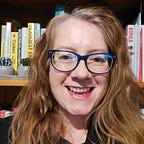Facing the fear: become a maths teacher — here’s why
As one of the many casual teachers in NSW, Australia, I’ve struggled to find permanent work. Yet I’m hearing that maths high school teachers are in short supply. Become one of them and you’re quickly nabbed, guaranteed a job for life. The penny has dropped. Why not retrain from primary teaching, I thought?
I’m making it happen some 35 years after I passed ‘General Mathematics’ in my final year of school. In 2017, I completed an online course to help me revised the maths students learn up to the end of year 10. In 2018, I’ll tackle a couple of HSC Year 11 subjects, and by 2020 hope to graduate with a diploma in mathematics.
Yes, I’m very rusty and my 11-year-old sometimes battles with me about our mathematical conceptions.
This morning, he was trying to guess the passcode for the TV (I’ve popped in there so he can’t watch TV willy-nilly). The code is just four digits. I was convinced the number of combinations were 10 to the power of 4. Each of the four-digit numbers could be anything from a zero to 9. So, that meant 10 x 10 x 10 x 10 — my reasoning.
My son tried to set me straight.
He said: “Look, it’s any number between 0000 and 9999, so there’s only 9,999 possibilities.”
That sounds right, I thought. So, how did I get a different answer: 10,000?
Then I realised he hadn’t added the possibility of the very first number, four zeros. That meant he had the same answer as mine, more or less.
Moving from ‘huh’ at each other’s explanations to an understanding we were seeing the problem from different perspectives is why I want more maths in the fabric of my life.I like that making mistakes in maths actually increases brain activity, exercises your brain
I also like that maths is so different to what I do mostly for a living — wordplay — as a writer. It blew my mind to learn that maths can be described as a narrative. Daniel Maycock tackles his piece, The narrative in number: Teaching the story in mathematics.
He writes: “We are happy to teach literature and history and theology through discussion and essay assignments, but suddenly change tactics for mathematics. But what if we taught mathematics in a more human (and perhaps humane) way? What if we taught math in narrative contexts?
“We often teach mathematics as if it were merely a list of skills to learn and concepts to memorize, and consequently treat students as robots to be programmed rather than as souls to be cultivated. Students usually have no idea why certain concepts and formulas were developed and even less idea where they came from. Consequently, students grow bored and frustrated and decide that they hate math.”
While I didn’t get bored with maths in my own high school years, I did view the subject as “concepts and formulas” — processes that I had to follow. It was one of my easiest subjects delivering instant or near-instant gratification as I worked through the exercises.
Now, I’m facing the challenge to relearn the content — as a student — and figure out ways to make it palatable for those studying maths for the sake of it. I want to infuse my future maths students with fresh enthusiasm for how they can make and see maths as relevant for their current and future lives. The idealistic teacher in me has found a new focus.
So much of the sciences and our everyday living — personal finances for example — pivot off maths. As a novice, I see and feel its beauty — my awe draws me to learn its intricacies.
Why not share that journey — chronicle it for others considering or even part-way through their own track retraining as a maths teacher? Why not create a community from where none may exist … just people going about changing their career tack who may not be buddying up with others. My journey is not a meandering, but a very intentional approach to learning, to getting out of my comfort zone and creating a community in the process.
My stories through my blog, Facebook posts (and engagement) and magazine publications leave signposts for others considering the same journey.
I’m not the expert, but I’ll interview them and share my learnings. As well, every TEDx talk that I watch, hand delivers me a gem of wisdom that adds to my mathematical knowledge. They are gems I want to share with others.
